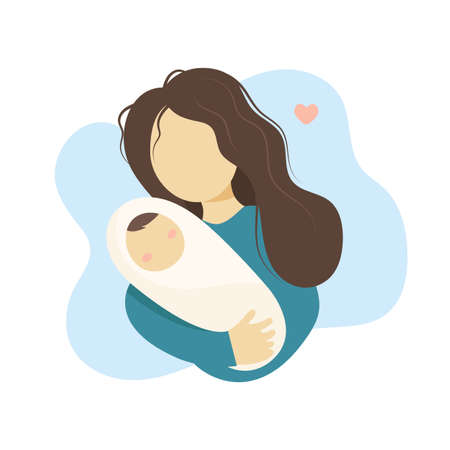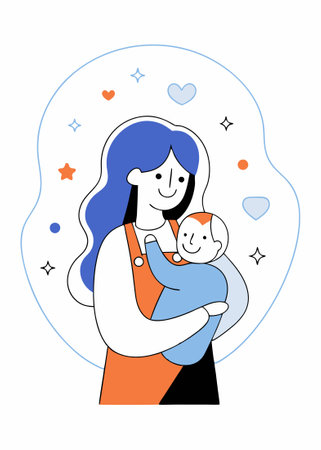1. How Breastfeeding Supports Your Babys Immune System
Breastfeeding is one of the best ways to support your babys developing immune system. Breast milk is packed with essential nutrients, antibodies, and beneficial compounds that help protect your little one from infections, illnesses, and even allergies. Unlike formula, which tries to replicate some of these benefits, breast milk naturally adapts to meet your babys changing needs.
The Immune-Boosting Components of Breast Milk
Breast milk contains a powerful mix of substances designed to strengthen your baby’s immune system. Here are some key components:
| Component | Function |
|---|---|
| Antibodies (IgA, IgG, IgM) | Protect against viruses and bacteria by forming a shield in the babys digestive and respiratory tracts. |
| White Blood Cells | Help fight off infections and build immunity. |
| Lactoferrin | A protein that prevents harmful bacteria from growing in the intestines. |
| Oligosaccharides | Nourish good gut bacteria and block harmful pathogens. |
| Cytokines & Growth Factors | Aid in immune system development and reduce inflammation. |
The Connection Between Breastfeeding and Allergy Prevention
Babies who are breastfed may have a lower risk of developing allergies. This is because breast milk helps shape a healthy gut microbiome, which plays a crucial role in immune function. A balanced gut can prevent overactive immune responses that lead to allergies like eczema, asthma, and food sensitivities.
The Role of Gut Health in Allergies
The gut is home to trillions of bacteria that influence how the immune system reacts to potential allergens. Breast milk provides prebiotics that feed beneficial bacteria, helping to create a strong defense against allergic reactions. Studies suggest that breastfeeding exclusively for at least 4–6 months may reduce the likelihood of common childhood allergies.
The Impact of Mom’s Diet on Allergies
A mother’s diet during breastfeeding can also affect her baby’s allergy risk. Some research suggests that exposing babies to small amounts of common allergens through breast milk may help their immune system recognize these substances without overreacting. However, if theres a family history of severe allergies, discussing dietary choices with a pediatrician can be helpful.
2. Common Food Allergens and How They Affect Breastfed Babies
As a breastfeeding mom, you might be wondering if the foods you eat could cause allergic reactions in your baby. While breast milk is the best source of nutrition for your little one, some common food allergens can pass through breast milk and potentially trigger symptoms in sensitive babies. Lets take a closer look at some of the most common culprits.
Dairy
Dairy products, including milk, cheese, and yogurt, are among the top allergens that can affect breastfed babies. Some infants may have a sensitivity to cows milk protein, which can lead to symptoms such as fussiness, gas, skin rashes, or even blood in the stool.
Nuts
Tree nuts (like almonds, walnuts, and cashews) and peanuts are another potential allergen. If there is a family history of nut allergies, you may want to monitor your baby for any signs of a reaction, such as hives, wheezing, or digestive discomfort after nursing.
Soy
Soy is commonly found in processed foods and infant formulas. Some babies who are sensitive to dairy may also react to soy proteins. Symptoms can include colic-like behavior, eczema, or digestive upset.
Other Potential Allergens
While dairy, nuts, and soy are among the most common triggers, other foods like eggs, wheat, fish, and shellfish can sometimes cause issues as well. Keeping track of what you eat and how your baby reacts can help identify any patterns.
Common Food Allergens and Possible Symptoms in Breastfed Babies
| Allergen | Possible Symptoms |
|---|---|
| Dairy (milk, cheese, yogurt) | Gas, fussiness, skin rashes, blood in stool |
| Peanuts & Tree Nuts (almonds, walnuts, cashews) | Hives, wheezing, digestive discomfort |
| Soy (soy milk, tofu, soy-based products) | Colic-like symptoms, eczema, digestive upset |
| Eggs | Skin rashes, vomiting, diarrhea |
| Wheat | Bloating, irritability, skin issues |
| Fish & Shellfish | Vomiting, swelling of lips or face |
What to Do If You Suspect a Food Allergy?
If you notice any unusual reactions in your baby after breastfeeding—such as persistent fussiness, skin changes, or digestive problems—it may be helpful to keep a food diary. Tracking what you eat and any symptoms your baby experiences can help identify potential triggers. If symptoms persist or worsen, consult with your pediatrician for guidance on possible dietary adjustments.
Every baby is different; while some may tolerate all foods without issue, others may be more sensitive. Paying attention to how your little one responds can help ensure they stay happy and healthy while nursing.

3. Signs of Allergies in Breastfed Babies
As a breastfeeding mom, its important to recognize the signs of food allergies in your baby. While breast milk is the best source of nutrition, certain proteins from the foods you eat can pass into your milk and trigger allergic reactions in some infants. Here are some common signs to watch for:
Skin Reactions
If your baby has a food allergy, you might notice changes in their skin. These reactions can appear shortly after feeding or take a few hours to develop.
| Skin Reaction | Description |
|---|---|
| Rashes | Red, bumpy patches on the face or body, sometimes resembling eczema. |
| Hives | Raised, itchy welts that may come and go. |
| Swelling | Puffiness around the eyes, lips, or other areas of the body. |
Digestive Issues
Your babys digestive system may also react negatively to allergens in your breast milk. Some common symptoms include:
- Excessive gas: Frequent tummy discomfort and bloating.
- Mucus in stool: Stringy or slimy appearance in dirty diapers.
- Bloody stool: Small traces of blood in poop, which may indicate an allergic reaction.
- Diarhea or constipation: Unusual changes in bowel movements.
- Vomiting: Frequent spit-up that seems more forceful than usual.
Irritability and Fussiness
A baby with a food allergy may show general signs of discomfort, such as:
- Crying more than usual: Persistent fussiness that is hard to soothe.
- Trouble sleeping: Waking up frequently due to discomfort.
- Pulling legs toward tummy: A sign of stomach pain or cramping.
When to See a Doctor
If you suspect your baby has a food allergy, talk to your pediatrician. Keep track of symptoms and any foods that may be triggering reactions. In severe cases, such as difficulty breathing or swelling of the face and throat, seek emergency medical attention immediately.
4. Elimination Diet: When and How to Try It
If you suspect that your baby has a food allergy triggered by something in your breast milk, an elimination diet can help pinpoint the culprit. This approach involves removing potential allergens from your diet and slowly reintroducing them to see if symptoms improve or return.
When to Start an Elimination Diet
If your baby shows signs of a food allergy—such as excessive fussiness, skin rashes, diarrhea, or mucus in stools—you might consider trying an elimination diet. However, before making any dietary changes, consult with your pediatrician or a lactation consultant to rule out other possible causes.
How to Follow an Elimination Diet
The key to an effective elimination diet is identifying the most common allergens and systematically removing them from your diet. Here’s how you can get started:
Step 1: Identify Common Allergens
Certain foods are more likely to cause allergic reactions in babies. The most common culprits include:
| Food Group | Examples |
|---|---|
| Dairy | Milk, cheese, yogurt, butter |
| Soy | Soy milk, tofu, soy sauce, edamame |
| Eggs | Scrambled eggs, mayonnaise, baked goods containing eggs |
| Nuts | Peanuts, almonds, cashews, walnuts |
| Wheat | Bread, pasta, cereals, baked goods |
| Fish & Shellfish | Shrimp, crab, salmon, tuna |
Step 2: Remove Suspected Allergens
You should eliminate all foods from the above list for at least two weeks. Be sure to read ingredient labels carefully, as allergens can be hidden in processed foods.
Step 3: Monitor Your Baby’s Symptoms
If your baby’s symptoms improve after eliminating these foods, it’s likely that one of them was causing the reaction. Keep a journal to track any changes in their digestion, skin condition, and overall comfort.
Step 4: Reintroduce Foods One at a Time
After two weeks (or once symptoms improve), start reintroducing eliminated foods one at a time every few days. Watch closely for any recurrence of symptoms. If symptoms return after eating a particular food, that may be the allergen.
Tips for Success on an Elimination Diet
- Stay patient: It takes time to identify food triggers accurately.
- Avoid processed foods: Many contain hidden allergens.
- EAT balanced meals: Ensure youre getting enough nutrients while eliminating certain foods.
- TALK to a professional: A doctor or dietitian can help ensure youre meeting nutritional needs while nursing.
An elimination diet can be a helpful tool in identifying food allergies in breastfed babies. By carefully removing and reintroducing certain foods while monitoring symptoms, you can better understand what might be affecting your little one.
5. When to Seek Medical Advice
Breastfeeding is a beautiful journey, but when allergies come into play, it can be stressful for both mom and baby. If you suspect your little one is reacting to something in your diet or experiencing allergy-related issues, its important to know when to seek medical advice. Here are some signs that its time to reach out to a pediatrician or lactation expert.
Signs That Indicate a Need for Medical Advice
If your baby shows any of the following symptoms, consider consulting a healthcare professional:
| Symptom | Possible Concern |
|---|---|
| Excessive fussiness or colic-like symptoms | Could be linked to food sensitivities or allergies |
| Frequent vomiting or reflux | Might indicate an allergic reaction to something in breast milk |
| Eczema or persistent skin rashes | A common sign of food allergies in infants |
| Mucus or blood in stool | A potential indicator of cow’s milk protein allergy (CMPA) or other intolerances |
| Persistent diarrhea or constipation | Certain foods may be affecting digestion negatively |
| Difficulties with weight gain or growth concerns | An allergy could be interfering with nutrient absorption |
| Trouble breathing, wheezing, or swelling | A severe allergic reaction requiring immediate medical attention |
Pediatrician vs. Lactation Consultant: Who to Call?
You may wonder whether you should see a pediatrician or a lactation consultant. Here’s how they can help:
| If You’re Experiencing… | Pediatrician or Lactation Consultant? |
|---|---|
| Your baby has severe reactions like trouble breathing or significant swelling. | Pediatrician (immediately) |
| Your baby has ongoing digestive issues (vomiting, diarrhea, blood in stool). | Pediatrician first, then lactation consultant if needed. |
| You need help with adjusting your diet while breastfeeding. | Lactation consultant. |
| Your baby has mild eczema or skin irritation that isn’t improving. | Pediatrician. |
| You suspect your milk supply is affected by dietary changes. | Lactation consultant. |
| Your baby is struggling with weight gain despite frequent feedings. | Pediatrician and lactation consultant. |
Tips for Your Doctor’s Visit
If youre planning to see a doctor about potential allergies, here are some ways to prepare:
- Keep a food diary: Track what you eat and any reactions your baby experiences.
- Note symptoms: Write down when symptoms occur and how severe they are.
- Take pictures: If your baby has rashes or skin reactions, photos can help with diagnosis.
- Avoid unnecessary eliminations: Dont cut out multiple food groups without guidance from a healthcare provider.
- Ask about allergy testing: In some cases, your pediatrician may recommend testing for common allergens.
- Simplify your diet if advised:If an elimination diet is recommended, follow it carefully and reintroduce foods gradually under supervision.
The Bottom Line: Trust Your Instincts!
Moms have a strong intuition when it comes to their babies. If you feel like something isnt right—whether its excessive fussiness, digestive troubles, or skin issues—dont hesitate to seek help. A pediatrician and lactation consultant can guide you through breastfeeding challenges related to allergies and ensure both you and your baby stay healthy on this journey.


